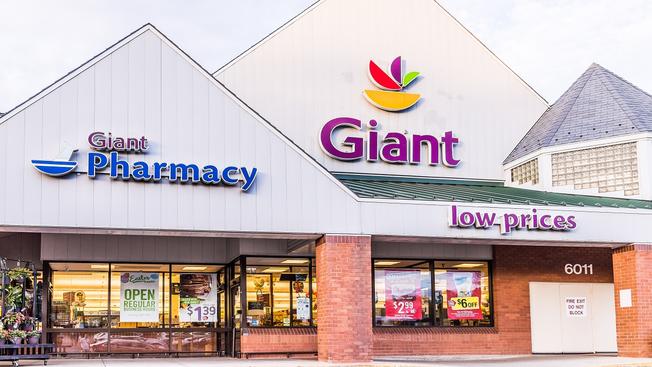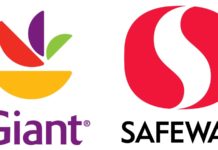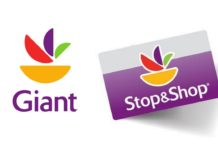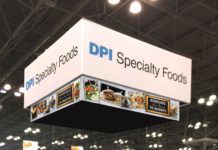Market share is growing, capital expenditures for new stores and major remodeling projects are on the rise and Baltimore-Washington market share leader Giant Food has regained much of the mojo it had lost in the 20 years since Ahold acquired the Landover, MD based chain.
Those were some of the takeaways from the company’s vendor meeting held at its corporate office and attended by more than 150 suppliers, brokers and distributors.
Kicking off the festivities was Gordon Reid, president of the regional chain, whose impact on the company during his five-year tenure has been very positive. The Scottish-born industry executive noted that Giant’s performance in 2018 was the best it’s been since he joined the company and he spoke emphatically about how parent company Ahold Delhaize USA’s decision to decentralize the organization 15 months ago has really helped Giant better create its own identity. He praised Giant’s headquarters and store level associates as being vital to the company’s improvement.
The improvement should continue as $175 million will be budgeted over the next two years for store expansion and improvement. Included in that cap-ex plan are one new store and 24 major remodels. Separate from that budget is a $21 million investment in a new Giant store in Olney, MD which will open next month at the site of a former Shoppers Food & Pharmacy unit (speculation is strong that Giant is a favorite to acquire as many as nine more Shoppers stores when that sale announcement is made in the near future. Giant already bought two other former Shoppers stores in Falls Church, VA and Alexandria, VA which have not yet reopened).
Tonya Herring, the retailer’s senior VP-merchandising, who moved to Landover from Carlisle, PA as part of the decentralization last January, urged the vendors to aggressively seek collaborative, growth-oriented relationships that focus on category growth, mutually profitable solutions, utilize consumer/shopper insights and are supported by solid analytics.
She also said that now that the category manager teams are fully in place, she is looking to increase the chain’s “best in class” (BIC) score. Last year’s tally, done only a few months after the new alignment began, showed Giant’s BIC score to be in the middle of the pack of 32 retailers surveyed.
Dyani Hanrahan, interim director of marketing, scored points with the audience by stressing the importance of Giant’s community roots (the retailer was founded in 1936) and its renewed focus on improving its emotional connection with customers. She spoke of the company’s enduring values: courage, integrity, care, teamwork and humor and said she believed Giant was in an optimal place to take even greater advantage of its strong position in the B-W area by understanding the uniqueness of its market which she noted is growing and highly competitive featuring more transient customers who are more youthful and tech savvy and better educated that most other marketing areas.
Hanrahan noted that Giant’s challenges lie in capturing younger shoppers and reducing the number of cross-shopping opportunities to the degree that consumers’ first shopping choice is Giant. According to the Washington native, that customer is the “seeker.”
The seeker? They are well-informed and busy shoppers; they are mostly women who are conscious of image – both their own and their grocery store’s. They enjoy good food and creative dishes but may not always have time to cook a full meal. And they regard the shopping experience as extremely important whether in-store or online. “Seekers” tend to be diverse, younger and digitally engaged people who are influenced by trends and new items.
Hanrahan also updated the crowd on Giant’s media efforts which include a new TV ad campaign featuring the theme “the little things are Giant” as well as the retailer’s updated print program which moves away from functional-oriented promotions to a more storytelling approach using better photos and “fresh opportunities.”
Joe Urban, Giant’s VP-distribution, provided an overview of the company’s warehouse facilities which includes its core 410,000 square foot DC in Jessup, MD. That depot distributes and selects 46 million cases of products annually in all departments. It also cross-docks an additional 6 million cases, delivers 89,000 loads annuals (from Jessup and the C&S ES3 DC in York, PA) and transports 12,000 backhauls a year. Urban and his team are also responsible for Peapod’s 150,000 square foot e-commerce warehouse in Hanover, MD.
The former Jewel executive also provided the vendors with a “partner optimization” checklist of items that they might look to improve. Those areas included improving package design, offering more accurate data integrity; more consistency on inbound loads; and overall improvement of communications across the vendor/warehouse spectrum.
The most passionate performance of the day belonged to Ira Kress, senior VP-operations. As the longest-tenured speaker during the three-hour meeting (35 years with Giant), Kress addressed the chain’s four-part operational plan for 2019: execute the plan and deliver the best store conditions; don’t just stock…sell!; deliver an exceptional and differentiated customer experience; and keep investing in and growing the business.
He admitted that improving store operations is a never-ending chase to try to achieve perfection, which he openly admitted was unachievable. But he acknowledged that during the past five years there has been tremendous improvement in the stores, both in how the supermarkets look and in the attitude of Giant’s store associates. Kress also stated that Ahold Delhaize USA’s decentralization plan has helped Giant better promote its local image.
He said he believes strongly in Giant’s program to optimize the ability of its store managers to sell new items via in-store tastings done by company associates (not demo companies). Kress has also encouraged associates to be more outgoing and friendlier and recognizes that customers sometimes regard no interaction as a sign of rudeness.
Michael Weinstock, VP-non-perishables, and Rick Manzi, VP-perishables, updated the vendors on some recent success stories and other key initiatives for the remainder of the year. Weinstock, former VP for Hershey before joining Ahold USA in 2015, detailed the components of Giant’s merchandising vision which includes curating distinctive assortment (including driving local relevance); delivering shopper value (simple, exciting promotions); developing and securing world class partnerships; and building a high performance team in order to achieve outstanding results.
Giant Food shares some non-perishable category management duties with sister “brand” Stop Shop, and coordinating with the team based in Quincy, MA is an important component to Giant’s merchandising success.
Weinstock also spoke about specific programs which have helped Giant’s success over the past year. The company’s “3-Day” promotion, not only helped curb eroding sales on Friday and Saturday, it put those two busy shopping days back in the win column for the 164-store chain. Another program, “Great Buys,” utilizes cardboard bins near the registers that are destined to boost unit sales by featuring typically fast-moving items on promotion. Weinstock said his team is also focused on improving results from items that appear on the front page of Giant’s weekly circular. In closing he implored the vendors in the audience to “bring us your intellectual capital.”
Manzi, who’s been with several Ahold USA divisions in a career that began in the mid-1980s, highlighted several local programs that made a substantial sales difference for Giant last year. Included among those perishables-driven initiatives were the company’s “Hero” brands (items (selected to drive trade-ups or new consumer occasions); “Hooper’s Crab Wagon” (a store event-driven program dedicated to selling fresh crabs and named after a crab house in Ocean City, MD); the addition of Giant’s value-added salmon tray pack program (in partnership with local seafood distributor NAFCO); and “Meals 1.0” (prepared foods including salads, sandwiches and side orders).
Moving ahead to 2019, Manzi said that Giant plans on developing an ethnic profile for each store (East Asian, Mexican, Central American, South American and Kosher). It will roll out “Meals 2.0” (including new programs such as Nature’s Promise rotisserie chicken and wing bar and enhanced fried chicken). Giant will also expand its program with Roseda Beef, the Maryland based processor of dry aged, high quality beef products, and increase its offerings in plant-based foods in the meat department. Manzi also praised Kress and the store ops team for their high level of execution with these programs.
President Gordon Reid then stepped back on stage to talk about a favorite personal project: Giant’s charitable focus. As in recent years Giant will work with three large non-profits – Johns Hopkins Children’s Center, Feeding America and the USO. Key area partners include the Capital Area Food Bank, Partnership for a Healthier America, Monumental Sports & Entertainment and Martha’s Table. Giant will again serve as the title sponsor of the National Capital Barbecue Battle and will be featured at many Monumental Events including Washington Bullets and Washington Capitals games at Capital One arena, which Monumental owns.
Giant is also making a multi-year $2.5 million commitment to the Ward 8 area of DC, the Southeast sector of our Nation’s Capital which has the lowest median income and the highest food insecurity rate in Washington.
Reid pledged that his company will offer improvements at the only full-service supermarket in the area – the Giant on Alabama Avenue. Those upgrades include the addition of a wellness area in the store, the addition of an in-store nutritionist who will help the citizens’ knowledge of healthy eating while also improving the financial affordability of food the area. Giant currently employs 12 in-store nutritionists at its stores. Related initiatives include in-store cooking demos; developing healthy recipe cards; working with local healthcare providers to enhance existing in-store/out-of-store health screenings; offering mobile healthy food options (a refurbished bus will provide healthy grocery options to the community); and promote a dedicated produce program with DC Greens, another area non-profit.
After speaking with about a dozen vendors after the meeting, virtually all said that this was the most comprehensive and informative presentation they’ve heard from the Landover-based organization in many years.
Yes, there are tangible benefits to a local decentralized approach.





